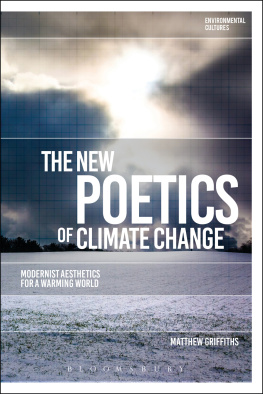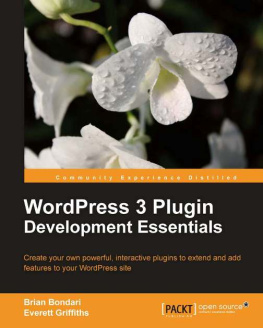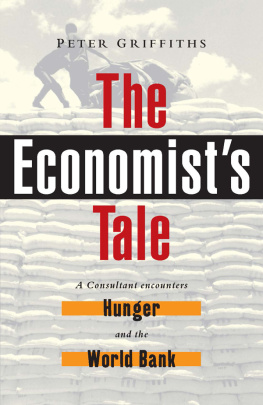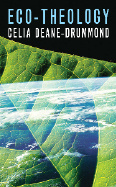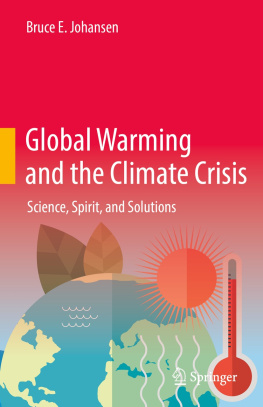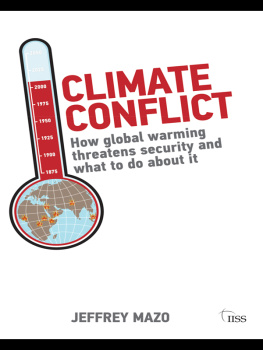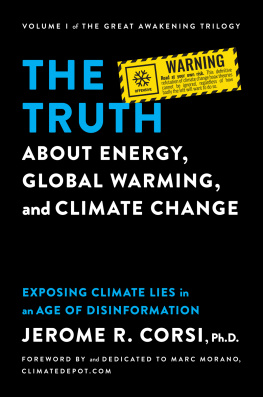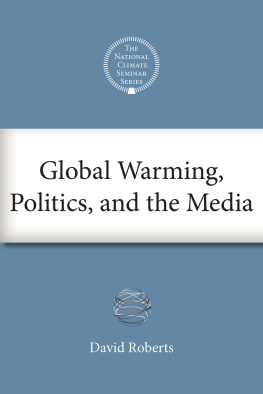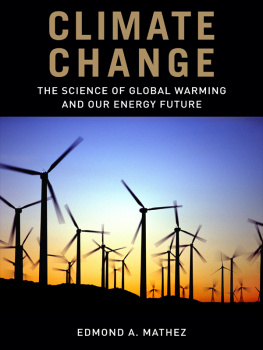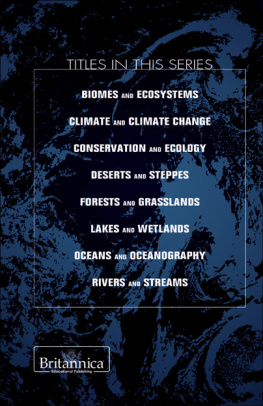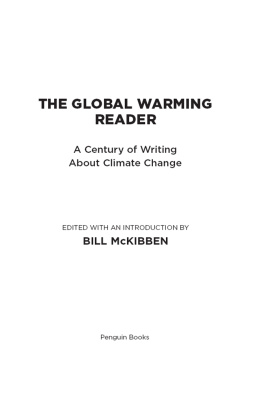The New Poetics of Climate Change
Environmental Cultures Series
Series Editors:
Greg Garrard, University of British Columbia, Canada
Richard Kerridge, Bath Spa University, UK
Editorial Board:
Franca Bellarsi, Universit Libre de Bruxelles, Belgium
Mandy Bloomfield, Plymouth University, UK
Lily Chen, Shanghai Normal University, China
Christa Grewe-Volpp, University of Mannheim, Germany
Stephanie LeMenager, University of Oregon, USA
Timothy Morton, Rice University, USA
Pablo Mukherjee, University of Warwick, UK
Bloomsburys Environmental Cultures series makes available to students and scholars at all levels the latest cutting-edge research on the diverse ways in which culture has responded to the age of environmental crisis. Publishing ambitious and innovative literary ecocriticism that crosses disciplines, national boundaries, and media, books in the series explore and test the challenges of ecocriticism to conventional forms of cultural study.
Titles available:
Bodies of Water , Astrida Neimanis
Cities and Wetlands , Rod Giblett
Ecocriticism and Italy , Serenella Iovino
Literature as Cultural Ecology , Hubert Zapf
Nerd Ecology , Anthony Lioi
The New Nature Writing , Jos Smith
Forthcoming titles:
Colonialism, Culture, Whales , Graham Huggan
Climate Crisis and the 21st-Century British Novel , Astrid Bracke
This Contentious Storm: An Ecocritical and Performance History of King Lear , Jennifer Hamilton
For Ray and Isabel Griffiths: from myself to your shelves
The New Poetics of Climate Change
Modernist Aesthetics for a Warming World
Matthew Griffiths
Bloomsbury Academic
An imprint of Bloomsbury Publishing Plc
Contents
This book began life as a doctoral thesis (although it did not end there), and I would like to acknowledge the support of those who helped me complete that undertaking. Ustinov College at Durham University provided several annual awards of a residential College Scholarship that enabled me to carry out my studies in the first place, and I am grateful to college staff and students for fostering such a welcoming, productive postgraduate community at Howlands Farm. Staff and students in Durhams Department of English Studies were likewise very supportive: I am grateful, in particular, to Dr John Clegg, who was the first to propose that I consider The Anathemata as part of this project, and also put many of my ideas to the test; to Dr Jack Baker, who offered valuable pointers on the work of Ezra Pound; and to Dr Jason Harding, whose thorough and challenging readings of my thesis, in his capacity as my secondary supervisor, enabled my argument to be more rigorous throughout. I also owe significant thanks to my supervisor Professor Timothy Clark, whose assiduous attention, sensitive direction and sympathetic support were essential throughout and beyond the researching and writing of this book. As my examiners, Professor Patricia Waugh of Durham University and Dr Harriet Tarlo of Sheffield Hallam University provided useful direction on how to develop the thesis. Meanwhile, Durham University Library in particular, the Basil Bunting Poetry Archive in its Special Collections the British Library and the Saison Poetry Library gave me the opportunity to consult a number of works in the course of my research. At Bloomsbury Academic, David Avital, Mark Richardson and Lucy Brown provided valuable help in steering the project home, and the copy-editing of Aruna Vasudevan tidied and tightened my academese. I must also thank the attentive Kim Storry at Fakenham Prepress, whose proofreading and patience have spared me plenty of typographical embarrassments. Needless to say, any remaining errors and omissions in the work are my own.
Some of my research has been presented in earlier versions at several events, among which I must give particular credit to the committee of the Ustinov Seminar, Durham University and to the organizers of the Culture and Climate Change symposium at Bath Spa University in summer 2010, at each of which I presented research on The Waste Land , as well to the convenors of Durham Universitys Inventions of the Text seminar series and the organizers of the University of Exeters Environment and Identity Conference in summer 2011, which both saw me present on contemporary climate change poetry. More generally, I have benefitted from being a member of the Association for the Study of Literature and the Environment (UK & Ireland), which has provided a supportive network of like-minded academics, with whom I have learnt and discussed much about ecocriticism, and given me the opportunity to approach series editors Greg Garrard and Richard Kerridge with the proposal for this book, which they kindly endorsed. I was very glad, too, to receive the encouraging responses of the proposals four anonymous readers, and in particular the incisive and sympathetic comments of the manuscripts anonymous reviewer, which have significantly helped me refine and hone my argument.
With a book of this nature, I am dependent on a number of publishers, who have generously extended permission to quote from the work of the poets I have considered. are copyright 1975 Valerie Eliot. All excerpts from these are reprinted by permission of Houghton Mifflin Harcourt Publishing Company, all rights reserved. Quotations from The Man on the Dump, The Idea of Order at Key West, The Snow Man, The Planet on the Table, The Plain Sense of Things, A Postcard From the Volcano, Notes Toward a Supreme Fiction, Credences of Summer, Sea Surface Full of Clouds, The Bouquet, The Poems of Our Climate, Variations on a Summer Day and Posie Abrutie are from The Collected Poems of Wallace Stevens by Wallace Stevens 1954 by Wallace Stevens and copyright renewed 1982 by Holly Stevens; excerpt(s) from The Necessary Angel: Essays on Reality and the Imagination by Wallace Stevens are copyright 1942, 1944, 1947, 1948, 1949, 1951 by Wallace Stevens; and excerpt(s) from Opus Posthumous: Poems, Plays, Prose by Wallace Stevens 1989 by Holly Stevens and 1957 by Elsie Stevens and Holly Stevens, copyright renewed 1985 by Holly Stevens; all of these are used by permission of Alfred A. Knopf, an imprint of the Knopf Doubleday Publishing Group, a division of Penguin Random House LLC. All rights reserved.
Finally, I am very grateful to my mother and father, Isabel and Raymond Griffiths, who provided moral and financial support during the course of my doctoral research and, over many years, fostered in me the intellectual aspiration to undertake such a project. Thanks, at last, to Allison Siegenthaler for much love, support, encouragement and patience, without which the work would never have reached this stage.
In 2009, as his term as UK poet laureate ended, Sir Andrew Motion was asked to write a piece that would feature in the Guardian , among commissions from other writers, To support the launch of the 10:10 campaign to reduce carbon emissions (Motion 2009b). The poem was to be set to music by the late Sir Peter Maxwell Davies for the University of Cambridge. Motion composed a five-sonnet sequence entitled The Sorcerers Mirror.
The first sonnet begins with the narrator explicitly locating himself in time and place: Midnight and midsummer in London. / I stand in my quarter-acre of garden (ibid.). The end-stopped opening line is still and verbless, fixing a moment in time. As the poem progresses, the narrator acknowledges that he cannot remain in his pastoral vantage point, a small (quarter-acre) green space in the encroaching metropolis. The solace he seeks is reminiscent of that sought by the narrator of Andrew Marvells The Garden; yet Motions choice of phrasing in at my back the spacious mulberry tree (ibid.) more clearly alludes to the earlier poets To His Coy Mistress, whose narrator declares at my back, I always hear / Times wingd chariot hurrying near (Marvell 2005: 51, lines 212). Motions allusion therefore sets up a tension between stillness and change, but one, ironically, in which the present offers greater stasis than the poetic tradition. For instance, whether we interpret his phrase what passes for its [the earths] sleep (Motion 2009b) as referring to the busyness of nocturnal London or to the continuation of natural processes while the citys inhabitants are in bed or, indeed, as a metapoetic recognition that likening night to human sleep is a fictive, anthropomorphic device it emphasizes the provisional quality of the calm he originally invokes. Yet the narrator strives to remain in the green eye of an urban storm, and signals a separation between himself and nature at the end of the first sonnet: the dark earth wakes and I look on, he remarks (ibid.), putting himself in the position of a privileged spectator.

